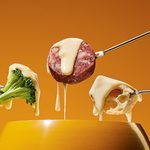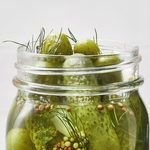Key Ingredients: Eggs
In the April 2009 issue of Reader’s Digest, our culinary experts Bonnie Stern and Fran Berkoff bring you some great recipes and nutritional tips for healthy home cooking based on one key ingredient. April’s key ingredient: Eggs!

Eggs have been a symbol of creation, fertility and new life since ancient times. Some cultures believe eggs bestow powers of renewal and rebirth-their round shape being symbolic of the cyclical and continuous nature of life. What better time than spring-a time of new beginnings-to bring you recipes of the symbol of rebirth.
How to Buy and Store
When it comes to buying eggs, there are many choices. Here are some:
- Brown Eggs: The colour of the shell depends on the breed of the hen. It does not affect the egg’s quality, flavour or nutrients. White shell eggs in Canada generally come from White Leghorn hens, while brown shell eggs generally are produced by Rhode Island Red hens. In addition, the colour of the yolk is determined by the type of feed the hen eats-it does not indicate egg quality, freshness or nutritional value.
- Free-Run Eggs: These eggs are produced by hens that roam in open-concept barns equipped with nests and perches. Their nutritional value is the same as that of regular eggs.
- Free-Range Eggs: These are produced in a similar environment to free-run eggs, but the hens have access to outdoor runs as well. Their nutritional value is the same as that of regular eggs.
- Organic Eggs: These are produced by hens fed ingredients grown without pesticides, herbicides and commercial fertilizer. Again, the nutrient content is the same.
- Omega-3 Eggs: These eggs, laid by hens whose diet has been enhanced with flaxseed-a source of omega-3 fatty acids-are higher in omega-3 fats than are regular eggs.
- Liquid Egg Products: These products contain pasteurized egg whites, a small amount of pasteurized yolk and other ingredients. Omega-3 fatty acids may be added.
- Liquid Egg Whites: These contain pasteurized egg whites only.
Eggs must always be refrigerated-in the store and at home. The best-before date on the carton is a guide to Grade A freshness. Eggs can be eaten a week or two beyond this date, but by this point the quality will have deteriorated.
Leftover raw egg whites and yolks should be put in airtight containers and stored in the refrigerator immediately. To prevent yolks from drying out, cover them with a little cold water. Drain the water before using.
To freeze whole eggs, beat until blended, pour into freezer containers, seal tightly and freeze. To freeze whites, break and separate the eggs one at a time, making sure that no yolk is mixed in with the whites. Pour them into freezer containers, seal tightly and freeze. Thaw frozen eggs overnight in the refrigerator or under running cold water and use them as soon as they’re thawed. Use thawed eggs only in dishes that will be thoroughly cooked.
Eggs-tremely Nutritious
- Eggs are an extremely nutrient-dense food. In one 72-calorie egg, you get 6 grams of protein, plus B vitamins, vitamins A, D and E, as well as iron and zinc.
- Eggs are low in saturated fat-a single egg having only 1.5 grams.
- Eggs are a good source of the antioxidant lutein, a compound also found in leafy green vegetables that is linked to a reduced risk of age-related macular degeneration-a leading cause of blindness in older adults.
Health News
Choline. Eggs are an important dietary source of choline, a nutrient required for the normal function of all cells. Research suggests that choline may be especially important for early brain development, it may be key in the development of an infant’s memory function and may improve memory capacity later in life. The National Academy of Sciences established that an adequate intake level of choline is 550 milligrams a day for men and 425 milligrams for women. A single egg contains 125 milligrams.
Cholesterol. An elevated blood-cholesterol level is a risk factor for heart disease. About 80 percent of the cholesterol in your body is produced by your liver, and the other 20 percent comes from the food you eat. Eggs are a source of dietary cholesterol (about 190 milligrams in a large egg yolk), but for most healthy people, it appears that the saturated fat and trans fat in your diet has much more significance in terms of blood-cholesterol levels than does the cholesterol in the food you eat.
According to a 2008 Harvard study of male physicians, eating an egg a day does not increase the risk of heart attack or stroke in healthy men. But, the same study suggests, if the men have diabetes, they are at greater risk.
Don’t forget to try these other eggs-ellent breakfast recipes by Bonnie Stern and Fran Berkoff:

Bonnie Stern has been teaching people to have fun in the kitchen, to eat more healthfully and to nourish their families since she started her cooking school in 1973.

Fran Berkoff is a consulting dietitian/nutritionist in Toronto, as well as a columnist for newspapers and magazines, and co-author or several books.



